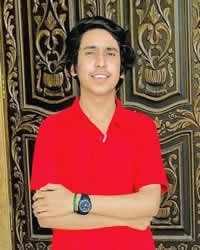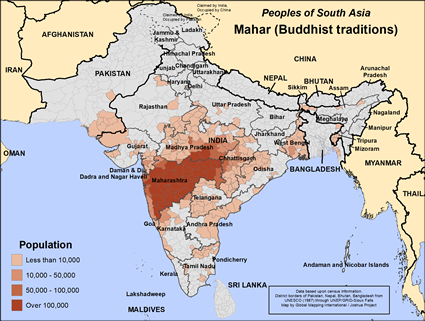The Mahar people were historically a part of a low caste, the lowest caste in the Hindu social system. This classification caused the Mahar people to face extreme discrimination and legal restrictions on day-to-day activities, out of the fear that they might contaminate higher caste Hindus. These restrictions included items such as when they were allowed to be in the city, whether they were allowed to spit on the ground, and how loudly they were allowed to talk. The Mahar people worked primarily as low-skilled laborers and speak the Marathi language.
Beginning around 1900, the Mahar people experienced a slow social revolution where they began to become aware of and fight for more rights due to British influence. This culminated in the conversion of close to 500,000 Mahar individuals to Buddhism in 1956 led by Bhimrao Ramji Ambedkar. Those who converted to Buddhism are typically no longer associated with the Mahar people group.
In 1949, the Indian constitution outlawed discrimination against the lowest Hindu social class. While this has helped the situation of those formerly in the low class, such as the Mahar people, they still face frequent residual discrimination.
Around the same time as the revolution led by Ambedkar, the Mahar people began to migrate to cities in search of work. They are often employed in low skilled labor such as masons, railway workers, bus/truck drivers, etc. In the rural areas, some Mahar people farm, though the Mahar people have never been an agricultural people group, likely due to their restricted access to land ownership.
Deep-seated belief in Hindu gods and a lack of fervent believers in their communities make it hard for the Mahar people to find their way to the cross and the empty grave.
Some of the Mahars practice Buddhism, a major world religion based on the teachings of Siddhartha Gautama or the Buddha, who lived in the 6th and 5th century BC in ancient India. The Buddha taught the Four Noble Truths by which one can gain spiritual knowledge and escape the endless cycles of reincarnation. Theravada, one of the two major branches of Buddhism, declares that by following the Noble Eightfold Path of right intentions and right actions that a Buddhist can achieve nirvana or a state of freedom and salvation. Mahayana Buddhism, the other main branch of Buddhism, asserts that by following the six perfections that a Buddhist can move along the path to Enlightenment. Tibetan Buddhism falls within the Mahayana school, although it also incorporates many shamanistic practices.
To most Buddhists, however, these things have far less meaning than their traditional beliefs, which are usually animistic. In animism, evil spirits must be appeased through prayers, sacrifices, and rituals. Buddhism allows people to mix Buddhist teachings with traditional religion.
Two of the important Buddhist yearly holidays are Vesak, the Buddha's birthday, celebrated in May or June, and Bodhi Day, the holiday which commemorates the day that the historical Buddha experienced enlightenment under a Bodhi tree.
Due to their historical and continual discrimination, the Mahar people face an uphill battle in daily life. Many struggle to obtain all the necessities of life. The Mahar people need both economic and social justice, in order to thrive.
Pray that God will begin restorative justice amongst the Mahar people, both socially and economically.
Pray that God will raise up missionaries that have a heart for the Mahar people.
Pray that God will soften the hearts of the Mahar people and that they will be responsive to the gospel.
Pray that God will establish a thriving church amongst the Mahar people and will give the current Christians the strength to persevere and continue evangelizing.
Pray for protection for the Mahar Christians from persecution.
Scripture Prayers for the Mahar (Buddhist traditions) in India.
Levi Boxell
| Profile Source: Joshua Project |












